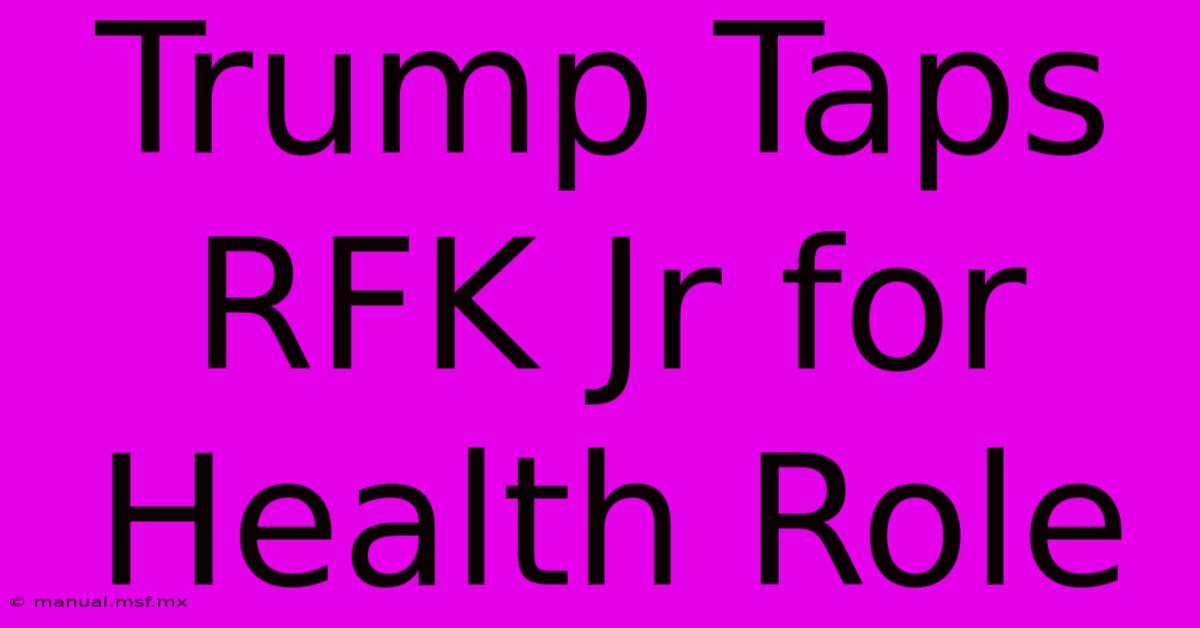Trump Taps RFK Jr For Health Role

Discover more detailed and exciting information on our website. Click the link below to start your adventure: Visit Best Website. Don't miss out!
Table of Contents
Trump Taps RFK Jr for Health Role: A Controversial Choice Sparks Debate
Is the appointment of Robert F. Kennedy Jr. to a health role in the Trump administration a sign of things to come? This controversial decision has sparked intense debate, highlighting the deep divisions within the Republican Party and the growing influence of anti-vaccine sentiment.
Editor Note: The appointment of Robert F. Kennedy Jr. to a health role in the Trump administration has been met with widespread criticism from health experts and medical professionals.
This appointment is significant for several reasons. Firstly, it demonstrates the growing power of the anti-vaccine movement within the Republican Party. Secondly, it raises concerns about the potential impact on public health, given Kennedy Jr.'s well-documented views on vaccines. Lastly, it highlights the increasing politicization of scientific issues in the United States.
Analysis:
This article delves into the complexities surrounding this appointment, examining the arguments for and against it. It analyzes Kennedy Jr.'s background, his stance on vaccines, and the potential implications of his new role. We also explore the broader context of the anti-vaccine movement and its influence on American politics.
Key Takeaways:
| Takeaway | Explanation |
|---|---|
| Controversial Choice | Kennedy Jr.'s appointment has been met with strong opposition from health experts and scientists. |
| Anti-vaccine Advocate | He has a long history of promoting conspiracy theories about vaccines and their link to autism. |
| Potential Public Health Risks | His influence could undermine public health initiatives aimed at promoting vaccination. |
| Political Implications | This appointment underscores the growing political divide on scientific issues, particularly vaccines. |
| Rise of Anti-vaccine Sentiment | The anti-vaccine movement has gained traction in recent years, particularly within the Republican Party. |
| The Role of Misinformation and Disinformation | The spread of misinformation and disinformation on social media has contributed to vaccine hesitancy. |
Robert F. Kennedy Jr. and the Anti-Vaccine Movement
Robert F. Kennedy Jr. is a well-known environmental activist and a vocal critic of vaccines. He has become a prominent figure within the anti-vaccine movement, promoting the false belief that vaccines are linked to autism. His views are not supported by scientific evidence, and they have been widely refuted by the medical community.
Potential Impacts on Public Health
Kennedy Jr.'s influence could have a negative impact on public health by undermining public trust in vaccines. This could lead to a decline in vaccination rates, making communities more susceptible to preventable diseases.
Political Divide and Scientific Issues
The appointment of Kennedy Jr. highlights the increasing politicization of scientific issues in the United States. The Republican Party has increasingly embraced anti-vaccine sentiment, while the Democratic Party has generally supported vaccination policies.
The Role of Social Media
The spread of misinformation and disinformation on social media platforms has contributed to the rise of vaccine hesitancy. Online forums and groups often promote anti-vaccine conspiracy theories, which can influence individuals' beliefs and behaviors.
Conclusion
The appointment of Robert F. Kennedy Jr. to a health role in the Trump administration is a controversial move that raises significant concerns about the potential impact on public health. His anti-vaccine views are not supported by science, and his influence could undermine efforts to promote vaccination. This appointment underscores the growing political divide on scientific issues and the influence of the anti-vaccine movement in American politics. The spread of misinformation and disinformation on social media is a major challenge that needs to be addressed to promote public health and scientific literacy.

Thank you for visiting our website wich cover about Trump Taps RFK Jr For Health Role. We hope the information provided has been useful to you. Feel free to contact us if you have any questions or need further assistance. See you next time and dont miss to bookmark.
Also read the following articles
| Article Title | Date |
|---|---|
| Cape Canaveral Space X Launch Starlink Liftoff Time | Nov 15, 2024 |
| Saoirse Ronan Squirming And Fears | Nov 15, 2024 |
| Bothams Daughter Defends Lords No Show Jibe | Nov 15, 2024 |
| Bothams Daughter Lords No Show Reason | Nov 15, 2024 |
| Paddy Mc Guinnesss Children In Need Cycle Done | Nov 15, 2024 |
| Taylor Swift Phenomenon Le Journal Review | Nov 15, 2024 |
| England Clinches West Indies T20 Series | Nov 15, 2024 |
| Afl Jersey Detail Sparks Outrage | Nov 15, 2024 |
| Jungheinrich Kursziel Von Barclays Auf 36 Euro | Nov 15, 2024 |
| Asia Australia Arabia Saudita Formazioni E Quote | Nov 15, 2024 |
